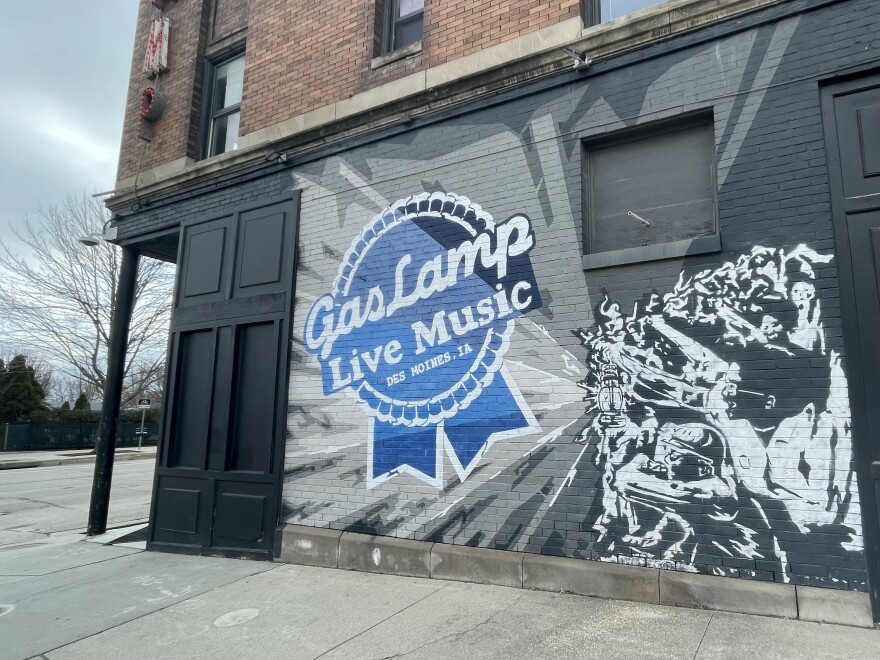The Gas Lamp music venue currently stands at 1501 Grand Ave., the former location of the legendary Iowa venue, Blues On Grand. On Feb. 13, Gas Lamp announced on Facebook that they will be closing their doors for good on July 9, 2023.
The closure, according to the Facebook post, is due to planned revitalization of the building that the Gas Lamp occupies. “While we do not know the exact timeline we do know that Gas Lamp is not a part of the final plan,” the venue said. The Krause Group, parent company of Kum & Go and landlord of the Gas Lamp, has yet to announce the specifics for the future of the building.
"We need more Gas Lamps"
The Gas Lamp is known for featuring Iowa acts, and its announced closure has incited public worry about where the future of local music will be housed. IPR Studio One recently conducted a survey of local music fans to see what they had to say on the issue.
“Venues (especially accessible/affordable ones) are dropping like flies,” a respondent from Des Moines said. “We need more Gas Lamps and Vaudeville [Mews] and less Funny Bones.”
The Gas Lamp closure is only the latest in a string of Iowa music venue closures in the last few years, including its predecessor, Blues on Grand in 2010, the Des Moines Social Club in 2019 and Vaudeville Mews in 2020. Outside of Des Moines, DG’s Tap House in Ames closed in 2019 and The Mill in Iowa City closed in 2020.
When asked his reaction to Gas Lamp’s announced closure, fellow venue owner Dave Deibler (of Cedar Falls’ Octopus College Hill) said that he feels “sadness when any venue or small locally owned small business closes. If you look at the size of Iowa’s population we actually have a good variety of live music venues,” Deibler said.
“The future for live music? As far as locally owned independent venues, I see a pretty flat line maintaining the status quo. It’s not a growth industry,” Deibler added.
The future for live music? As far as locally owned independent venues, I see a pretty flat line maintaining the status quo. It’s not a growth industry.Dave Deibler, Octopus College Hill
“My honest belief is that the share of Iowans who are interested in going out of their way to experience original live music is shrinking,” Fred from Ames said. “At this moment, I see lots of people who will go to their local county fair to see cover bands and country music artists (and nothing wrong with that), but the demographic of people who get excited about their local ‘scene’ of artists trying new and original ideas is either stagnant or getting smaller.”
“It’s sad that [Gas Lamp] is closing, as small venues like that not only encourage smaller musicians just starting, but also encourages music in Iowa at all,” Kaitlyn from Wilton said.
Small to mid-size venues are a vital part of a music ecosystem
Mickey Davis is the executive director of the Greater Des Moines Music Coalition (DMMC), an organization that recently conducted an Iowa music community climate survey and sponsored research into how to nurture Des Moines’ status as a “music city.” Davis agreed that small venues like Gas Lamp and the other recently closed locales are vital for the local music scene.
“Here in Des Moines, it's concerning to see so many venues, especially of a similar size, close so close to one another in time. It’s like the Gas Lamps that hold 100, 200 people that are crucial for development. You need to be able to play for 10 people and then 50 people and then 100 people in venues like that before you can start to think about playing venues like Wooly’s or Val Air Ballroom, the larger venues in town.” Davis said.
“It's really important for our scene and for any scene to have kind of smaller, mid-sized music venues and those small and mid-sized music venues are often the ones that close the quickest in the face of challenges. So we're in a moment now where, with the number of small venues in Des Moines that we've seen close, we're really hurting for those kinds of developmental opportunities for emerging musicians.”
What now?
To remedy the blow to the local music scene caused by small venue closures, Davis said it is time to get civic and political and business leaders on board with the idea that music venues are critical to the health of a music ecosystem.
“We like to champion Des Moines as this city full of the arts and every travel brochure about the city of Des Moines has a musician plastered in it somewhere, but between the average income of musicians that we're seeing in Des Moines, and some of these small venues going away, I think it's a moment to have some serious conversations.” Davis said.
“What does our relationship as a city with music look like? What are we prepared to do? Are there business incentives, loans or grants that might be able to support the development of new music businesses? I think it's a moment where we can ask ourselves and ask those who may be in positions of power: how much do they value music as an integral part of what makes Des Moines what it is? And how can we support the next generation of music venue owners and music businesses and musicians who are trying to call Des Moines home?”
What does our relationship as a city with music look like? What are we prepared to do?Mickey Davis, DMMC executive president
Members of the music community said that one of the best ways to support small venues moving forward is to buy tickets and attend their shows. “Go see a show!” Deibler encouraged.
“If people can spend $100s on tickets to fests or arena shows, [they can try] to go to ONE local show once a month. Even once a quarter,” another anonymous survey-taker said.
“Everybody attend at least one show per week. EVERYBODY.” Brian from Cedar Falls said.
Survey respondents also recommended that more performance venues and rehearsal spaces open their doors for musicians, that public radio take more time to promote local music on the air and that legislation be passed to protect “Iowa artists and music educators from having to register with the state and collect sales tax."
There is still local music to support
Despite some Iowans on social media expressing sentiments that the local music scene is dying because of small venue closures like the Gas Lamp, those surveyed and interviewed remained generally positive about the quality of the music scene and the support of the local music community that sustains it.
“Something that I think is really unique about Des Moines but also may put our venues in precarious situations like what's happening with the Gas Lamp - really dissimilar to most major music markets in the United States, and even markets of our size - other than the planned development [of a Live Nation-owned venue] in Waukee, we don't have any Live Nation or AEG or corporate owned venues in Des Moines,” Davis said. “All of our venues are independently owned and operated, which allows for freedom in programming and allows for all of the money that's been made by music venues to circulate back into the local music economy.”



